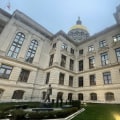As the political landscape in the United States continues to evolve, the role of political advocacies has become increasingly important. These organizations, also known as interest groups or pressure groups, aim to influence public policy and promote specific causes or issues. In Fayetteville, Georgia, there are a number of political advocacies that are actively involved in local and state politics. However, like any other city in the country, these groups face certain legal limitations that can impact their ability to effectively advocate for their causes.
The Role of Political Advocacies in Fayetteville
Fayetteville, Georgia is a small city located in Fayette County, with a population of just over 17,000 people.Despite its size, the city has a vibrant political scene, with several active political advocacies working to shape local policies and decisions. These groups represent a diverse range of interests and issues, including education, healthcare, environmental protection, and civil rights. One of the most well-known political advocacies in Fayetteville is the Fayette County Tea Party. This group advocates for limited government and fiscal responsibility at both the local and national level. They have been involved in various campaigns and initiatives, including supporting candidates for local office and organizing protests against government spending. Another prominent advocacy group in Fayetteville is the Fayette County NAACP.
This organization focuses on promoting civil rights and social justice for African Americans and other marginalized communities. They have been involved in issues such as police reform, voting rights, and education equity.
The Legal Limitations Faced by Political Advocacies
While political advocacies play an important role in shaping public policy, they are not without their limitations. In Fayetteville, as well as across the United States, these groups must navigate a complex web of laws and regulations that govern their activities. These limitations can impact their ability to effectively advocate for their causes and can even result in legal consequences if not followed.Lobbying Restrictions
One of the most significant limitations faced by political advocacies is the restriction on lobbying activities.Lobbying refers to attempts to influence government officials or policies through direct communication, such as meetings, phone calls, or emails. In Fayetteville, as well as at the state and federal level, there are strict laws that regulate lobbying activities. For example, in Georgia, any organization that spends more than $250 in a calendar year on lobbying activities must register as a lobbyist with the Georgia Government Transparency and Campaign Finance Commission. This includes reporting any expenditures related to lobbying, such as travel expenses or advertising costs. In addition, there are also restrictions on who can be a lobbyist. In Fayetteville, city officials and employees are prohibited from lobbying on behalf of any organization or individual.
This is to prevent conflicts of interest and ensure that decisions are made in the best interest of the public.
Campaign Finance Laws
Another limitation faced by political advocacies is campaign finance laws. These laws regulate how much money can be donated to political campaigns and how it can be spent. In Fayetteville, as well as at the state and federal level, there are strict limits on campaign contributions from individuals and organizations. For example, in Fayetteville, individuals are limited to donating a maximum of $2,800 per election cycle to a candidate for local office. This includes both primary and general elections.Organizations, such as political advocacies, are also subject to contribution limits and must report any donations made to candidates or campaigns.
Non-Profit Status
Many political advocacies in Fayetteville and across the country are registered as non-profit organizations. This status allows them to receive tax-exempt status and accept donations from individuals and organizations. However, this also means that they must adhere to certain rules and regulations set by the Internal Revenue Service (IRS).One of the main limitations of being a non-profit organization is that political advocacies are prohibited from engaging in partisan political activities. This means that they cannot endorse or oppose specific candidates or political parties.They can, however, engage in issue advocacy and support or oppose specific policies or legislation.
Navigating the Legal Limitations
Despite these limitations, political advocacies in Fayetteville continue to play a crucial role in shaping public policy and promoting important causes. To navigate the legal landscape, these groups must ensure that they are well-informed about the laws and regulations that govern their activities. This includes regularly monitoring changes in laws and regulations, as well as seeking legal advice when necessary. It is also important for political advocacies to maintain transparency and accurately report their activities and expenditures to avoid any potential legal consequences.In Conclusion
Political advocacies in Fayetteville, Georgia face a number of legal limitations that can impact their ability to effectively advocate for their causes. These include restrictions on lobbying activities, campaign finance laws, and rules for non-profit organizations.However, with careful navigation and adherence to these laws, these groups can continue to play a vital role in shaping local policies and decisions.






